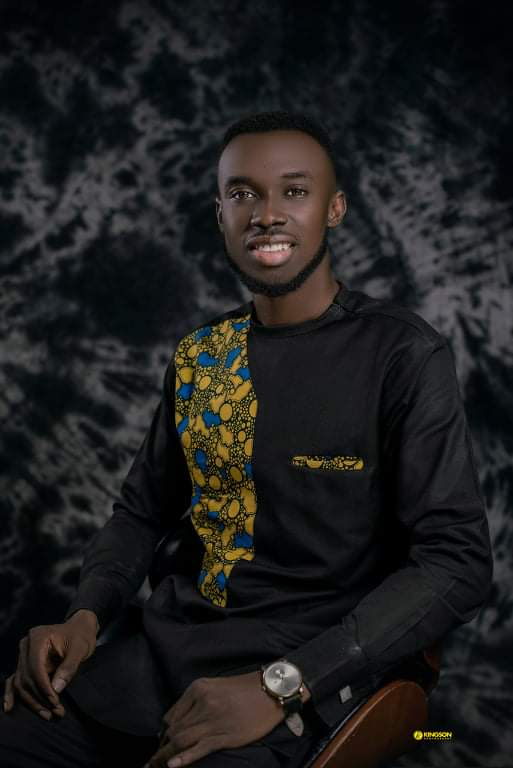What inspired you to start Yolre Limited?
My name is Ade Olusola Kunmi and I’ve always been inspired by the concept of being my own boss. Since secondary school, I have always been interested in business. My first business was selling perfume shortly after graduating from secondary school in 2006. Since then, I’ve started multiple businesses. This includes food packaging and water production. In 2015, after completing my National Youth Service in Nigeria, I established my first company in Nigeria, Rocace Foods Limited.
Yolre, on the other hand, grew out of my love for arts and culture. So Yolre was inspired by my enthusiasm for business and the arts. It was, however, registered as a corporation when I moved to the United Kingdom.

What problem does your startup solve, and how are you addressing it?
our primary goal is advancing the arts, yolre was established to be a catalyst for change in the creative industry. we recognize unique challenges faced in the arts and culture sectors, we sought to create a platform that not only supports the creative industry but also drives its growth and sustainability.
My company serves as a bridge between African artists and the rest of the globe. We showcase artist works from Nigeria and Africa to the rest of the world through online exhibitions. We also assist real estate developers, homeowners, and businesses in locating the appropriate artworks for the interior decorating of their houses. We also specialize in cultural entertainment and providing cultural entertainment for occasions in Nigeria and the diaspora.
What strategies have helped you attract and retain customers since launching?
One of the techniques I’ve used to attract clients is to promote my business through advertising and content creation. As a startup, the company often rely on Google and social media advertising.
Content creation also plays an important role. Others came through recommendations. So they contacted us, and we were able to retain them as customers by demonstrating a thorough understanding of what we do and an understanding of what they want. Clients feel safer when they know the person they’re dealing with is well-knowledgeable in the industry. Confidence is also important, and these are the personal characteristics that have helped us keep clients. And when it comes to our services, we make sure that our clients are satisfied throughout the process of our dealings, which has helped us to retain them.
What sets your business apart from competitors?
I believe my interest in the arts plays a significant role. Because, aside from making a profit which is one of our goals, I love what I do and am very passionate about it. So it’s a good thing I enjoy business, so why not turn my passion into a business? So my passion for what I do drives me to go above and beyond to delight my customers. Also, my knowledge of arts and culture has been beneficial. I can readily tell and suggest what type of artwork is required for a customer after they tell me their tale or background; I know exactly what type of art piece is required, as well as what the piece should represent and say. This is one of the factors that distinguishes my company from my competition.
How did you fund your startup in the early stages?
I supported my startup with my own finances. Yolre is still in its early stages. And, as the majority of our business is providing services/consultation, our clients offer the budget for what they require, which we then use to do their tasks. As we continue to achieve new milestones, we will undoubtedly seek external money from investors, but for the time being, I feel we are good.
My belief is that as much as we want to progress, we should not rush into something we are not prepared for. I don’t care how long the journey takes; doing things right is far more important to me than doing things quickly.
What were some of the biggest challenges you faced, and how did you overcome them?
Some of the problems we faced included competing with larger organizations in the industry. I also believe that competition is beneficial, as it forces us to look inward to see how we can do something unique that will set us apart from our competitors. And as we laid out our swot analysis, we realized that our size as a smaller company is not a weakness, but rather a strength. So our strength lies in being a smaller company and a startup; we are very ambitious to the point where we want to impress our clients by ensuring that we do and exceed what the larger companies do because we need our customers to trust us.
Larger corporations may not be as specific and thorough to the ultimate customer of the product. But we can ensure that client happiness is a priority for us, from the moment our customers place an order until it is delivered. We ensure that they have a wonderful customer service experience. We have a lot to prove as a start-up, therefore we go above and above, which has also been our strength.

Can you share a key achievement or milestone you’re particularly proud of?
One of my key achievements is being recognized by the UK government as a leader in the field of arts and culture. This recommendation has enabled me to settle and establish my company in the United Kingdom. So the time it took me in terms of personal development when emigrating to the UK has been significantly less than most.
In just a few years, I’ve been able to launch three businesses in the UK and release music projects for two of my artists through my record label, and the songs have gone viral on social media. I have an online school and we are working for a commencement date of January 2025.
Where do you see your business in the next five years?
In the next five years, I believe we will be a significant participant in the arts, cultural, and entertainment sectors. I am particularly concerned with ensuring that the products we promote and sell are authentically African. The same goes for the artwork, music, and every other thing we do. In the next five years, we hope to have established a thriving learning community through our academy, where African history will be researched and our story shared in our own unique way.
What tools, software, or technology have been essential to your success?
I believe that having a basic understanding of design and how to use social media is important. These are basic abilities that everyone requires, and as simple as they are, they are also critical to any business. Also, my training in business communications at the Hertfordshire Business School has helped a lot.
I am also very talented in Adobe Photoshop and Adobe Premier Pro. I also have an excellent understanding of website design, which allows me to complete numerous tasks quickly at the start of my business. We also make use of Canva, because Canva offers pre-designed templates which is faster to use and can be edited to one’s liking. These tools have been essential to our marketing.
Worth Reading: Joseph Mambwe: The Entrepreneur Who Built a $2.5 Million Fitness App All with Zero Employees
If you could give one piece of advice to your past self when you first started, what would it be?
That will be to continue learning. I discovered that whatever I learned was crucial to my development. As a child, my father would frequently push me to read newspapers, even though I had no idea what I was reading. However, he did say one thing that I remember: pick up any book you find around you and read it, even if it was only a few lines of pages. As a result, I am constantly eager to master new skills.
Everything I’ve learned over the years has served me well in some manner. I have opinions and points of view on a wide range of things, so when I meet someone and they are talking about anything specific, I always have something to say. So, my advice is to keep learning and broadening your knowledge; don’t be closed-minded.
Have you experienced failure in business, and if so, what did you learn from it?
Yes, I have. I founded my first business directly out of secondary school. I was 16 years old at the time, and I sold perfumes on credit to my friends, who happened to be my first clients. Only one paid, and the rest never paid until today. So that was the first business disaster I documented. I was unable to continue because I had not recouped my initial funds. I’ve had other failed enterprises, but I’m constantly learning as I move forward. Those failures taught me what to do and what not to do in business.
What books, podcasts, or resources would you recommend to aspiring entrepreneurs?
The majority of the books I read were in paperback and were quite helpful to me. The books I will recommend to aspiring entrepreneurs are Think Big by Donald Trump, The 7 Habits of Highly Effective People by Stephen R. Covey, The 50th Law by 50 Cent, and 48 Laws of Power by Robert B. Greene, The Prince by Niccolo Machiavelli, and Rich Dad, Poor Dad by Robert Kiyosaki.
Other novels I enjoyed were audiobooks, which are available on Spotify. The Way of the Superior Man by David Deida, and Hustle Harder, Hustle Smarter by 50 Cent. I rarely listen to podcasts, with the exception of Jordan Peterson, whom I greatly adore and respect. I also listen to many motivational lectures on Spotify.
Jordan Peterson podcast.
The Way of the Superior Man (ebook)
What advice would you give to someone just starting their entrepreneurial journey?
I usually give advice based on my personal experience, and I will say this to anyone who is just starting out. Simply do it. There is no use in planning and waiting until everything is perfect; simply start and you will sort it out along the way.
As a startup, you shouldn’t focus too much on writing a business plan since you might be setting yourself up to fail. A business plan provides the business owner the appearance that it must be strictly followed for a business to be successful, and with that mindset, the business owner will be resistant to change when necessary.
However, I believe that as a startup, you must be adaptable. You must be able to adapt your strategy and apply new tricks and methods that were not initially planned. Simply know what you want to do and who you want to target, and leave room for flexibility on how you plan to achieve it. I believe that business plans are best suited for larger organizations that already have a working structure in place.
Another thing I’d like to mention is that anybody coming out of secondary school should start a business and fail. The early years of 16 to 25 are ideal for experimentation. Experiment with a variety of business ideas or skills, learn from your failures. Even if you fail, You will learn. Do not worry too much about whether it will be successful or not; instead, utilize it as a learning experience in understanding business. The experience will be useful at some point in your entrepreneurial journey.
What do you think about Olusola’s Story? Share your thoughts in the comment below.


































